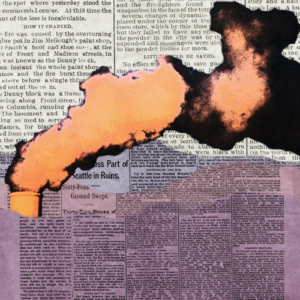The week’s best online fiction, with recommendations from FictionDaily’s editors.
“Black Dog” by Shruti Swamy in Kartika Review
I can safely rely on Indian fiction as being its own genre now. Colorful clothes. Sad questions of ancient and modern and postmodern alienation. Dust, spices, and dying animals. Sex. Blindness. Unrealistic imagery of America. Tyranny of family and polytheism. Etc. As someone that’s never been to India I imagine all the stories take place in some suburb of Wes Anderson’s Darjeeling Limited. I know I can always go back there through one of these stories, as if they’re windows keeping me safe from the chaos they frame; clearly and calmly, for my viewing pleasure, translating this other world into my native English, as though the native language of the place reduces in some logical way down to English, like anything well-colonized. Though predictable as a window of exchange, this story does it well, and without the characteristic urgency of an overly crafted plot line disingenuously imbued with tragedy. The story plods along–scene by scene, color by color, corpse by corpse–doing its job with a calm sense of the Indian poetic. — David Backer
“from Kepler” by Charles Freeland in Sugar Mule
Charles Freeland’s the sort (a professor and poet by trade) to get one thinking about poetry, and prose as poetry, and what rogue scum it was divided the two with a stick, as Tiresias the mating snakes. Has then prose become the male (banausic, lymphatic, dream-troubled, vengeful yet too tired to kill) and poetry female? Or vice versa? That’s a pity, either way. That such hard distinctions should… Ought we to jettison the “heightened imagery and emotional effects” under any conceivable circumstances [Wikipedia]? Freeland is funny. There’s that as well, humor, to cherish. Freeland writes, quite funnily, and with prose and poetry gonads both: “If only we were placed on a level surface and had merely to choose a direction from all those that present themselves to us like so many balloons tied to the antennas of the vehicles on a used car lot.” You had to be there, maybe. And you can be. See if you can find the Clorox reference. — Ryan Nelson
“Roadkillers” by Pete Risley in Plots With Guns
I’ve talked up the Midwest’s scribe of the human sewer, Pete Risley, before. And with stories like Roadkillers pounding out of Risley’s lair on a nigh-monthly basis, we will and must hear of his obscene and elementally human voice again. This short, bad stretch of wasted road tells of how, in a lethal level of heat, a journey can get far off course and best intentions can curdle into something toxic. Every cringe is inflicted with Risley’s stark and conversational tone. That emphasizes the universal nature of nastiness in his story: How we are no more immune to wickedness and accident – others’ and our own – than we are from the weight of the sun. Speeding along with Roadkillers will send you swiftly through a sick, sad reach of human nature. It may seem even familiar territory. Albeit warped real, real wrong. — M. C. Funk
This post may contain affiliate links.









